HAPPY SUNsan
Japanese Name: HAPPY SUNさん
Literal Translation: Mr. HAPPY SUN
Release Date: February 2002
Original Japanese: WWW  PDF PDF
Always smiling with good weather! When there is only SUNsan, everyone all around can become happy. When you have SUNsan with you, you can also become popular?! When there is only SUNsan, everyone all around has lighthearted fun! Therefore, there are always tons of friends at SUNsan's side. When he has a friend who is feeling down, SUNsan uses a teruteru bouzu¹ to cheer them up. Kind and warm, SUNsan is popular with everyone.☆
いつもニコニコいい天気!SUNさんがいるだけで、まわりはみんなhappyになれる。そんなSUNさんグッズをもっているとあなたも人気者になれる?!SUNさんがいるだけで周りのみんなは楽しくウキウキ!だからSUNさんのそばはいつも仲間でいっぱい。落ち込んでいるおともだちには、SUNさんがてるてる坊主をくれて元気づけてくれます。やさしくってあったかい、SUNさんはみんなの人気もの☆
Characters

|

|

|

|

| SUNsan
Mr. SUN
This sun character is always smiles and making everyone happy. When
you feel down, he uses a teruteru bouzu¹ and cheers you up.
いつもニコニコみんなを幸せにしてくれる太陽キャラ。落ち込んでいるとてるてるぼうずをくれて、元気づけてくれるよ。
| Otsukisan to Tsukiusagi
Mr. Moon and Moon Rabbit
When it becomes night, he takes SUNsan's place. The mochi² that Tsukiusagi makes is very delicious!
夕方になるとSUNさんと交代する。つきうさぎのつくもちはとってもおいしい!
| Nijigumokun
Little Rainbow Cloud
These two always love to be in high spirits! They are also close
friends of SUNsan. These two stick together when there is a rainbow.
いつも二人ではしゃぐのが大好き!SUNさんともとっても仲良し。ふたりの仲がいいときは虹がかかっているよ。
| Taifuukun
Little Typhoon
Besides those 3, there are actually many more [in the weather group]; the bigger the number [of group members], the bigger the storm?! If you ride on Taifuukun, you can move super fast.
3号以外にも実はたくさんいて、番号が大きくなればなるほど、実物も大きくなるとか?! たいふうくんに乗るとすごい早さで移動できるんだって。
| Inazumasan
Mr. Bolts of Lightning
Their faces look a little scary but actually there are times when they are nice, too. Apparently, they slightly admire SUNsan.
ちょっとコワイカオをしているけど、実はやさしいところもあるんだよ。 SUNさんにちょっとあこがれているらしい。
|

|

|

|

| Kinjyo no Tori
Neighborhood Bird
This bird lives in SUNsan's neighborhood. Everyday, he wakes up with SUNsan, as SUNsan lets him know it's morning. Because SUNsan can't fly in the sky, he appears by riding the clouds.
SUNさんの近所に住むとり。毎朝SUNさんと一緒に起きて、朝を知らせてくれる。空を飛べないのでくもに乗って登場するよ。
| Kasakun
Little Umbrella
As his special skill is that he can open and expand, he tries to make everyone happy by taking care of them.
とじたりひらいたりできる特技をみんなにみてもらうのがうれしいみたい。
| Teruterukun
Little Teruteru¹
Night after night, SUNsan makes this teruteru bouzu. He is an amazing omamori,³ as if you receive this, you will become very happy.
SUNさんが夜な夜な作るてるてるぼうず。これをもらうととってもハッピーになれる、すごいおまもり。
| Yukidarumasan
Mr. Snowman
He loves SUNsan, and when it's winter, they have a lot of fun. However, they can't get close at all or he will accidentally melt.
SUNさんのことが大好きで冬に会えるのを楽しみにしている。しかし、溶けてしまうのであまり近づけないんだって。
|
Images
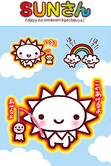 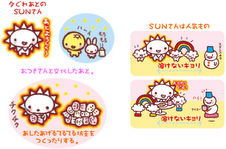 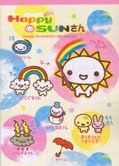 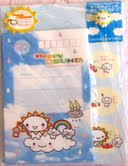 
Translation Notes
- Teru teru bōzu (てるてる坊主), literally meaning "shiny-shiny Buddhist priest," is a little traditional hand-made doll made of white paper or cloth that Japanese farmers began hanging outside of their window by a string. This amulet is supposed to have magical powers to bring good weather and to stop or prevent a rainy day. "Teru" is a Japanese verb which describes sunshine, and a "bōzu" is a Buddhist monk (compare the
word bonze), or in modern slang, "bald-headed." Today, children make teru-teru-bōzu out of tissue paper or cotton and string and hang them from a window to wish for sunny weather, often before a school picnic day. Hanging it upside down - with its head pointing downside - acts like a prayer for rain. They are still a very common sight in Japan. Wikipedia: Teru teru bozu
- Mochi (餅) is a Japanese rice cake made of glutinous rice pounded into paste and molded into shape. In Japan it is traditionally made in a ceremony called mochitsuki. While also eaten year-round, mochi is a traditional food for the Japanese New Year and is commonly sold and eaten during that time. In Japanese tradition, rabbits live on the moon where they make mochi. This comes from interpreting the pattern of dark patches on the moon as a rabbit standing on tiptoes on the left pounding on an usu, a Japanese mortar. A popular culture manifestation of this tradition can be found in the character title character of Sailor Moon, whose name is Tsukino Usagi, a Japanese pun on the words meaning "rabbit of the moon." Wikipedia: Mochi, Wikipedia: Moon Rabbit
- Omamori (お守り) are Japanese amulets dedicated to particular Shinto deities as well as Buddhist figures. The word mamori (守り) means protection, with omamori meaning "honorable protector." Wikipedia: Omamori
|






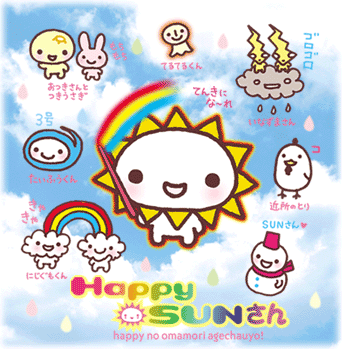









I love him very much. :)
ReplyDelete